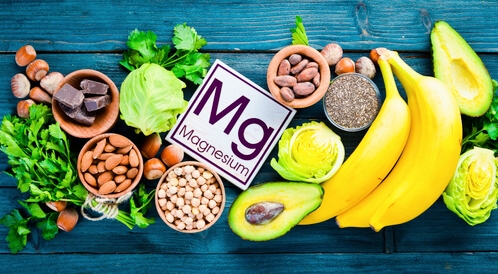Understanding Magnesium Deficiency: Symptoms and Solutions

Magnesium is crucial for over 300 enzymatic reactions in the body, aiding muscle movement, nerve signaling, blood sugar regulation, and bone strength.
When magnesium intake declines due to stress, poor diet, or certain medications, the body may exhibit subtle yet significant warning signs, as reported by the Times of India.
* 9 Warning Signs of Magnesium Deficiency:
1 _ Muscle Cramps and Spasms:
These often occur in the legs or eyelids, as magnesium regulates muscle contraction, and its deficiency makes relaxation difficult.
2 _ Unexplained Persistent Fatigue:
A lack of magnesium hampers energy production in cells, leaving you feeling tired even after adequate rest.
3 _ Insomnia or Sleep Disturbances:
Magnesium affects melatonin and GABA, substances that calm the nervous system; its deficiency can lead to difficulties falling or staying asleep, and even vivid dreams or nighttime insomnia.
4 _ Unexplained Anxiety or Restlessness:
A drop in magnesium levels makes the brain more sensitive to stress, resulting in anxiety, low mood, or irritability, often mistaken for emotional fatigue.
5 _ Heart Arrhythmias:
Magnesium is essential for the heart's electrical signals, and its deficiency can manifest as palpitations or increased heart rate, particularly in individuals with existing heart issues.
6 _ Brittle Nails and Osteoporosis:
Magnesium aids calcium absorption; its deficiency can lead to weakened bones and nails, with these changes becoming noticeable over time.
7 _ Headaches and Migraines:
A magnesium deficiency affects neurotransmitters and blood vessel contraction in the brain, leading to recurrent and sometimes severe headaches.
8 _ Tingling or Numbness in Extremities:
Nerves rely on magnesium, and its deficiency can cause tingling or numbness in the hands and feet due to weakened nerve signals.
9 _ Cravings for Sugar:
A decrease in magnesium weakens insulin function, resulting in sudden cravings for sweets or significant blood sugar fluctuations, increasing the risk of prediabetes or insulin resistance over time.
* 5 Natural Foods to Address Magnesium Deficiency:
1 _ Pumpkin Seeds:
A handful provides half of the daily magnesium requirement and is rich in healthy fats and antioxidants.
2 _ Spinach and Dark Leafy Greens:
Vegetables like kale and Swiss chard can be added to smoothies, soups, or cooked dishes to boost magnesium intake.
3 _ Almonds and Cashews:
These nuts are excellent for maintaining nerve and heart health, being rich in magnesium, protein, and vitamin E.
4 _ Avocado:
High in magnesium and potassium, avocados help reduce muscle cramps and enhance body hydration.
5 _ Dark Chocolate:
A small piece of chocolate containing 70% cocoa or more can improve mood and reduce inflammation while boosting magnesium levels.
Magnesium deficiency often lurks behind common symptoms like fatigue, cramps, and anxiety. However, simple dietary adjustments can help restore levels naturally. If symptoms persist despite lifestyle changes, it is advisable to undergo a blood test with a healthcare provider.
